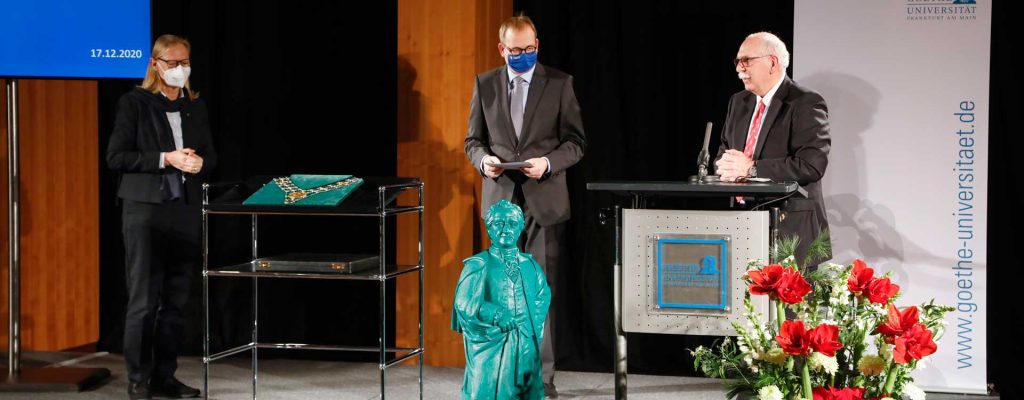
The symbolic transfer of the Goethe University presidency from Professor Birgitta Wolff to Professor Enrico Schleiff took place during an online public university event on 17 December 2020. Schleiff was elected as new president on 8 July 2020. On 1 January 2021, the elected president will officially assume the office for a term of six-years. University President Birgitta Wolff has held the office since 2015 and will switch to a professorship in business and economics at the start of 2021. Due to coronavirus restrictions, the event took place in a very small circle and was broadcast via livestream.
The chair of the university council, Professor Matthias Kleiner, who made the appointment, said: “Birgitta Wolff has achieved outstanding things in the six years of her presidency. Her term in office has been very good for Goethe University in all its facets, and I am pleased and sincerely grateful that I was able to accompany the president and her executive board as chair of the university council. In Enrico Schleiff, an excellent successor was chosen through an election process that, while not entirely easy, was nonetheless successful, and I wish him all the best for his term of office: many ideas and arguments, a lot of courage and energy, plenty of action and room to manoeuvre, a lot of luck and success! The university council will be a good partner to Enrico Schleiff.”
The Hessian Minister of Science, Angela Dorn, said on the occasion of the handover of office: “Under the presidency of Professor Wolff, Goethe University has made a great effort in the past two semesters to enable largely digital study during the coronavirus pandemic. This outstanding commitment concludes a presidency in which she has devoted all her energy and knowledge to Goethe University: The term ‘Third Mission’ is now associated with her name nationwide, because from the beginning she was focused on transfer and was a founding member of the Federal Agency for Disruptive Innovations. After the disappointing results in the Excellence Strategy, she quickly rolled up her sleeves, subjected Goethe University to a self-critical analysis process and promoted a course of reform and professionalisation. Professor Wolff leaves behind a university with future-proof structures and strong development prospects. I thank her from the bottom of my heart for this commitment. I am sure that Professor Schleiff, with his diverse experience, will be able to build well on this foundation. I wish him every success in his new task and Professor Wolff all the best in her future career.”
Frankfurt’s mayor, Peter Feldmann, said: “Dear Professor Wolff, in July 2014, you were the first woman to be elected president of this university. The great Hilmar Hoffmann spoke of a sign of the power of renewal – rightly so, as we know today. You have brought Goethe University into the city, to the citizens. You opened it up, made it a place of debate. The expression and result of your commitment is the “Bürger-Uni” event series. which has been successful among our citizens, and fitting for Frankfurt as the birthplace of German democracy. I ask you: stay with us, stay with Frankfurt. Your election, dear Professor Schleiff, also sets a clear course. You want to sharpen the university’s profile by founding a research alliance and by increasing internationalisation. Diversity makes us strong – our international city is proof of that. As a university in this city, wanting to become even more international, even more diverse, is, in my view, exactly the right approach. I look forward to learning more and discussing your plans with you.”
The President of Goethe University, Professor Birgitta Wolff, said: “For six years I was able to serve Goethe University as president and help shape it. By the same token, Goethe University and the many great people I worked with and all I learned during this time have given me an infinite amount. Many of these inspiring contacts will – I am sure – continue beyond my term of office. I am handing over to Enrico Schleiff a Goethe University that has made great progress in important areas of its internal governance and culture of cooperation. Today, more than ever, Goethe University is a university that has learned that it can develop its strengths much better in cooperative networks than outside of them – whether on a regional, national or international level. We have been working hard on a realignment of structures for the last three years. I wish Enrico Schleiff success in the further development of our wonderful Goethe University.”
The elected president of Goethe University, Professor Enrico Schleiff, said: “I am very much looking forward to the task of further developing our Goethe University as president together with my colleagues. The election was a great sign of confidence and trust from the Goethe community. At the same time, I understood the vote of the extended senate as a special mandate to me to strengthen the cohesion within Goethe University. I will therefore also use the first weeks and months in office to personally approach various people and groups within and outside Goethe University. I am convinced that as members of the Goethe community, we are all united by the aspiration to make a contribution to the development and shaping of society with Goethe University in a drastically changing world through trend-setting research and teaching – each and every one in his or her own position. I will personally work to ensure that we continue to develop the necessary freedom in research, teaching and third mission. I thank Gitta Wolff for her enormous commitment and the ground-breaking impulses she has set in the further development of Goethe University.”








